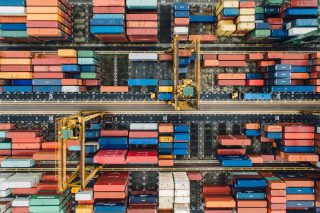A.P. Moller – Maersk and IBM have created TradeLens, a solution jointly developed by the two companies to apply blockchain to the world’s global supply chain.
This follows the January announcement when the duo unveiled the collaboration aimed at offering a global trade digitization platform by using blockchain technology.
As explained, the new blockchain-enabled shipping solution is designed to promote more efficient and secure global trade, bringing together various parties to support information sharing and transparency, and spur industry-wide innovation.
As part of the TradeLens early adopter program, IBM and Maersk also announced that 94 organizations are actively involved or have agreed to participate in the TradeLens platform built on open standards.
The TradeLens ecosystem currently includes more than 20 port and terminal operators across the globe, Pacific International Lines (PIL) which has joined Maersk Line and Hamburg Süd as container carriers participating in the solution, customs authorities in the Netherlands, Saudi Arabia, Singapore, Australia and Peru along with customs brokers Ransa and Güler & Dinamik, beneficial cargo owners (BCOs), freight forwarders, transportation and logistics companies.
TradeLens uses IBM Blockchain technology as the foundation for digital supply chains, empowering multiple trading partners to collaborate by establishing a single shared view of a transaction without compromising details, privacy or confidentiality. Shippers, shipping lines, freight forwarders, port and terminal operators, inland transportation and customs authorities can interact more efficiently through real-time access to shipping data and shipping documents, including IoT and sensor data ranging from temperature control to container weight, according to Maersk and IBM.
Using blockchain smart contracts, TradeLens enables digital collaboration across the multiple parties involved in international trade. The trade document module, released under a beta program and called ClearWay, enables importers/exporters, customs brokers, trusted third parties such as customs, other government agencies, and NGOs to collaborate in cross-organizational business processes and information exchanges, all backed by a secure, non-repudiable audit trail.
During the 12-month trial, Maersk and IBM worked with dozens of ecosystem partners to identify opportunities to prevent delays caused by documentation errors, information delays, and other impediments.
More than 154 million shipping events have been captured on the platform, including data such as arrival times of vessels and container “gate-in”, and documents such as customs releases, commercial invoices and bills of lading. This data is growing at a rate of close to one million events per day.
“We believe blockchain can play an important role in digitizing global shipping, an area of the global economy that moves four trillion dollars of goods every year. However, success with the technology rests on a single factor -bringing the entire ecosystem together around a common approach that benefits all participants equally,” Bridget van Kralingen, senior vice president, IBM Global Industries, Solutions and Blockchain, commented.
“Our work with Maersk and other enterprises in the shipping ecosystem has shown that blockchain can be used to form a strong, connected network in which all members gain by sharing important data and that together we can transform a vital part of how global trade is conducted,” van Kralingen added.
Since announcing the jointly developed solution to digitize global trade earlier this year, and based on feedback from various members of the global supply chain ecosystem who would like to adopt the technology, IBM and Maersk have modified the go to market model and will now deliver their solution through an extension of their pre-existing collaboration agreement instead of a joint venture.
“Our joint collaboration model allows us to better address key feedback from ecosystem participants while ensuring TradeLens interoperability and data protection among Maersk, IBM and all ecosystem participants. We strongly believe this will maximize industry adoption,” Mike White, TradeLens leader for Maersk, said.
Standards discussions are actively underway with openshipping.org and work to align the TradeLens APIs with UN/CEFACT standards is in progress. The TradeLens APIs are open and available for developer access and feedback from participants in the platform.
The solution is expected to be fully commercially available by the end of this year.
Source: http://worldmaritimenews.com


